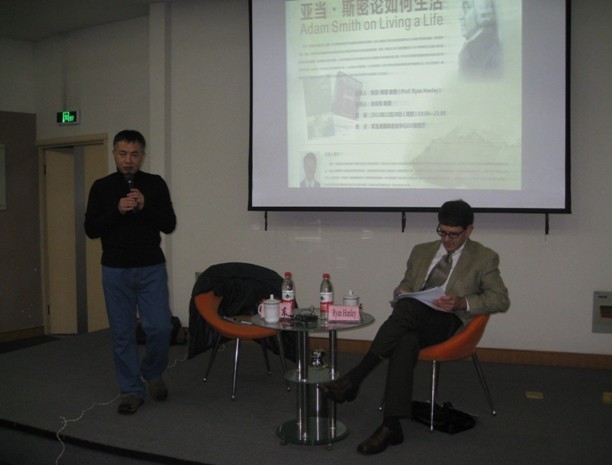Lecture 107 of “Zhejiang University Oriental Forum” was held in the International Conference Center of Zijingang Campus on 20th December, 2012. Professor Ryan Hanley from Department of Politics,
The opening remarks of Professor Xu were on the various problems for the human existence and living in the commercial society. The Theory of Moral Sentiments and Wealth of Nations written by Adam Smith in 18th Century provided with some inspirations for solving the puzzles the people met in the issues of virtue and wealth. Professor Hanley began by exploring the challenges from Adam Smith against Rousseau and explained Adam Smith’s three ideas about the commercial society. First, what did Adam Smith defend for the commercial society? Second, Adam Smith’s criticism against the commercial society. Third, Adam Smith’s solution to the commercial society. The last point was of great concern to us all, since it was actually another question, i.e. how we live in the commercial society.
As to the first question, Rousseau thought human beings were selfish; however, the commercial society changed the nature of this selfishness and people began to live for recognition, honor and respect. The changes in morality brought about the changes in the social strata: changing from self-sufficiency to labor division in pursuit of luxuries, which led to the dependence between the people, therefore, the social contract began to take shape due to the formation of a series of political and legal rules, so the civil liberty finally came to an end. Professor Hanley said the responses from Adam Smith were systematic in his two important works.

Adam Smith maintained that the prosperous commercial society enabled everybody in the society to live a better life, so inequality, in a certain sense, was unavoidable and sometimes beneficial. In his word, the commercial society decreases the poverty, instead of inequality.
Second, Adam Smith also saw the corruption of the commercial society upon the people’s morality and people became more self-centered. However, he said that people (the poor, in particular), would like to seek recognition and praise under this self-centeredness, and their goals were usually lost and they failed to understand the real source of happiness came from what is worthy of recognition and praise.
Finally, how to balance the social prosperity and individual morality and how to remedy the defects in the commercial society. Professor Hanley thought we should pay attention to two points. First, the practical solutions provided by Adam Smith. Smith emphasized the role of government, in particular, the role of education on preventing the moral corruption. However, Professor Hanley highlighted another solution: the cultivation of morality, including prudence, tolerance and benevolence, which were thought to have the ability of averting the corruption on morality.
The students benefitted a lot from the interaction after the lecture.
By Fan Liangcong


